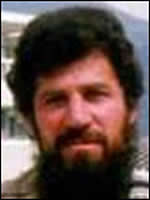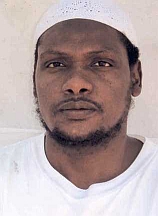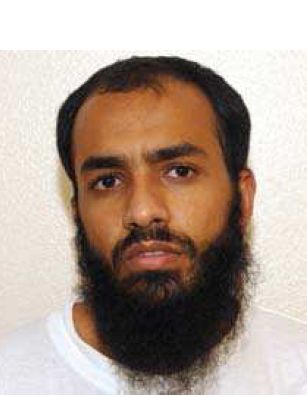
Ibrahim Ahmed Mahmoud al Qosi is a Sudanese militant and paymaster for al-Qaeda. Qosi was held from January 2002 in extrajudicial detention in the United States Guantanamo Bay detainment camps, in Cuba. His Guantanamo Internment Serial Number is 54.

Bashir Nashir Ali Al-Marwalah is a Yemeni, who was captured in Pakistan, on September 11, 2002, and transferred to extrajudicial detention in the United States Guantanamo Bay detention camps, in Cuba. His Guantanamo Internment Serial Number is 837. Joint Task Force Guantanamo counter-terrorism analysts reports that Al-Marwalah was born on December 1, 1979, in Al-Haymah, Yemen.
Al Wafa is an Islamic charity listed in Executive Order 13224 as an entity that supports terrorism. United States intelligence officials state that it was founded in Afghanistan by Adil Zamil Abdull Mohssin Al Zamil, Abdul Aziz al-Matrafi and Samar Khand. Affiliated groups include The Taliban and Al Qaeda.

Nashwan Abdulrazaq Abdulbaqi al-Tamir, better known as Abd al-Hadi al-Iraqi is an Iraqi member of Al-Qaeda who is now in United States custody at Guantanamo Bay detention camp in Cuba.

Ahmed Abdul Qader is a citizen of Yemen, who was held in extrajudicial detention in the United States Guantanamo Bay detainment camps, in Cuba from June 18, 2002, to January 14, 2015. His detainee ID number was 690. The Department of Defense estimated that Qader was born in 1984, in Sana'a, Yemen.
Mohamed Saleban Bare is a Somali refugee who was held in extrajudicial detention in the United States Guantanamo Bay detention camps, in Cuba.
Ahmed Mohammed Ahmed Haza al-Darbi is a citizen of Saudi Arabia who was held in the United States Guantanamo Bay detainment camps, in Cuba from August 2002 to May 2018; in May 2018, he was transferred to Saudi Arabia's custody. He was the only detainee held at Guantanamo released during President Donald Trump's administration.

Othman Ahmed Othman Al Omairah was a citizen of Saudi Arabia who was held in extrajudicial detention in the United States Guantanamo Bay detainment camps, Cuba.

Mohammed Abdul Malik Bajabu is a citizen of Kenya currently held in administrative detention in the United States' Guantanamo Bay detention camps, in Cuba. He was born in Busia, Uganda, but has Kenyan citizenship. Abdul Malik was captured in February 2007, on suspicion of leading a terrorist bomb-plot in Mombasa. He was transferred to Guantanamo on 26 March 2007. Abdul Malik is a confirmed member of the East Africa al-Qaeda network as well as a confirmed member of the Council of Islamic Courts and the Islamic Part of Kenya. He "actively participated" in the facilitation of weapons and the planning of terrorist acts against the U.S., according to the Joint Task Force (JTF) at Guantanamo Bay. He was recommended for continued detention under the Department of Defense's control. The JTF gave Abdul Malik a high risk threat against the United States' interests and allies. He has no reports of disciplinary infractions as of May 22, 2007, granting him a low detention risk value. Abdul Malik does, however, have a high intelligence value.

Ayman Saeed Abdullah Batarfi is a Yemeni doctor who was held in extrajudicial detention in the United States Guantanamo Bay detention camps, in Cuba. His Guantanamo Internment Serial Number was 627.
Abdullahi is a male given name also common as a surname. It is a variation of the Arabic personal name Abdullah. The variant Abdullahi is most common in Nigeria, Saudi Arabia, Somalia, and Ethiopia.
There were a total of four Somali detainees in Guantanamo of a total of 778 detainees that have been held in the Guantanamo Bay detention camps, in Cuba since the camps opened on January 11, 2002. The camp population peaked in 2004 at approximately 660. Only nineteen new suspects, all "high value detainees" have been transferred there since the United States Supreme Court's ruling in Rasul v. Bush. As of January 2008 the camp population stands at approximately 285.
In late 2008, the Department of Defense published a list of the Guantanamo captives who died in custody, were freed, or were repatriated to the custody of another country. The list was drafted on October 8, 2008, and was published on November 26, 2008. Subsequently almost two hundred more captives have been released or transferred, and several more have died in custody.

Muhammaed Yasir Ahmed Taher was a citizen of Yemen, who was held in extrajudicial detention in the United States's Guantanamo Bay detention camps, in Cuba. His Guantanamo Internment Serial Number was 679. American intelligence analysts estimate he was born in 1980, in Ibb, Yemen.







